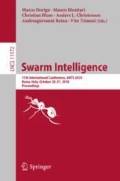Abstract
The team selection problem is usually solved by ranking candidates based on the preferences of decision-makers and allowing the decision-makers to take turns selecting candidates. While this solution method is simple and might seem fair it usually results in an unfair allocation of candidates to the different teams, i.e. the quality of the teams might be quite different according to the rankings articulated by the decision-makers. In this paper, we propose a new method based on Ant Colony Optimization (ACO), where the selection process is performed in a new context, with more than two decision-makers selecting from a common set of candidates. Furthermore, a plugin implementing this method for the KNIME platform was developed.
Access this chapter
Tax calculation will be finalised at checkout
Purchases are for personal use only
References
Ahmed, F., Deb, K., Jindal, A.: Multi-objective optimization and decision making approaches to cricket team selection. Appl. Soft Comput. 13(1), 402–414 (2013)
Bello, M., Bello, R., Nowé, A., García-Lorenzo, M.M.: A method for the team selection problem between two decision-makers using the ant colony optimization. In: Collan, M., Kacprzyk, J. (eds.) Soft Computing Applications for Group Decision-making and Consensus Modeling. SFSC, vol. 357, pp. 391–410. Springer, Cham (2018). https://doi.org/10.1007/978-3-319-60207-3_23
Bello, M., Lugo, L., García, M.M., Bello, R.: Un método para la generación de rankings en la selección de equipos de trabajo en ambiente competitivo basado en algoritmos genéticos. Revista Cubana de Ciencias Informáticas 10(2), 196–210 (2016)
Berthold, M.R., et al.: KNIME - the Konstanz information miner: version 2.0 and beyond. ACM SIGKDD Explor. Newsl. 11(1), 26–31 (2009)
Canós, L., Casasús, T., Liern, V., Pérez, J.C.: Soft computing methods for personnel selection based on the valuation of competences. Int. J. Intell. Syst. 29(12), 1079–1099 (2014)
Dadelo, S., Turskis, Z., Zavadskas, E.K., Dadeliene, R.: Multi-criteria assessment and ranking system of sport team formation based on objective-measured values of criteria set. Expert Syst. Appl. 41(14), 6106–6113 (2014)
Diario, A.: NFL draft 2016: todas las elecciones de \(1^\text{a}\) y \(2^\text{ a }\) ronda (2016)
Dorigo, M., Gambardella, L.M.: Ant colony system: a cooperative learning approach to the traveling salesman problem. IEEE Trans. Evol. Comput. 1(1), 53–66 (1997)
Dorigo, M., Maniezzo, V., Colorni, A.: Ant system: optimization by a colony of cooperating agents. IEEE Trans. Syst. Man. Cybern. Part B (Cybern.) 26(1), 29–41 (1996)
Hayano, M., Hamada, D., Sugawara, T.: Role and member selection in team formation using resource estimation for large-scale multi-agent systems. Neurocomputing 146, 164–172 (2014)
Hooper, R.S., Galvin, T.P., Kilmer, R.A., Liebowitz, J.: Use of an expert system in a personnel selection process1. Expert Syst. Appl. 14(4), 425–432 (1998)
Iglesias, A.I., Ilisástigui, L.B., Cordovéz, T.C., Rodríguez, D.M.: Nuevos plugins para la herramienta knime para el uso de sus flujos de trabajo desde otras aplicaciones. Ciencias de la Información 46(1), 47–52 (2015)
Kulik, C.T., Roberson, L., Perry, E.L.: The multiple-category problem: category activation and inhibition in the hiring process. Acad. Manag. Rev. 32(2), 529–548 (2007)
Lai, Y.J.: IMOST: interactive multiple objective system technique. J. Oper. Res. Soc. 46(8), 958–976 (1995)
Mohamed, F., Ahmed, A.: Personnel training selection problem based on SDV-MOORA. Life Sci. J. 10(1) (2013)
Nowé, A., Verbeeck, K., Vrancx, P.: Multi-type ant colony: the edge disjoint paths problem. In: Dorigo, M., Birattari, M., Blum, C., Gambardella, L.M., Mondada, F., Stützle, T. (eds.) ANTS 2004. LNCS, vol. 3172, pp. 202–213. Springer, Heidelberg (2004). https://doi.org/10.1007/978-3-540-28646-2_18
Puris, A., Bello, R., Herrera, F.: Analysis of the efficacy of a two-stage methodology for ant colony optimization: case of study with TSP and QAP. Expert Syst. Appl. 37(7), 5443–5453 (2010)
Stützle, T., Hoos, H.H.: Max-min ant system. Future Gener. Comput. Syst. 16(8), 889–914 (2000)
Tavana, M., Azizi, F., Azizi, F., Behzadian, M.: A fuzzy inference system with application to player selection and team formation in multi-player sports. Sport Manag. Rev. 16(1), 97–110 (2013)
Vrancx, P., Nowé, A., Steenhaut, K.: Multi-type ACO for light path protection. In: Tuyls, K., Hoen, P.J., Verbeeck, K., Sen, S. (eds.) LAMAS 2005. LNCS (LNAI), vol. 3898, pp. 207–215. Springer, Heidelberg (2006). https://doi.org/10.1007/11691839_13
Wang, J., Zhang, J.: A win-win team formation problem based on the negotiation. Eng. Appl. Artif. Intell. 44, 137–152 (2015)
Webber, W., Moffat, A., Zobel, J.: A similarity measure for indefinite rankings. ACM Trans. Inform. Syst. (TOIS) 28(4), 20 (2010)
Author information
Authors and Affiliations
Corresponding author
Editor information
Editors and Affiliations
Rights and permissions
Copyright information
© 2018 Springer Nature Switzerland AG
About this paper
Cite this paper
Lugo, L., Bello, M., Nowe, A., Bello, R. (2018). A Solution for the Team Selection Problem Using ACO. In: Dorigo, M., Birattari, M., Blum, C., Christensen, A., Reina, A., Trianni, V. (eds) Swarm Intelligence. ANTS 2018. Lecture Notes in Computer Science(), vol 11172. Springer, Cham. https://doi.org/10.1007/978-3-030-00533-7_26
Download citation
DOI: https://doi.org/10.1007/978-3-030-00533-7_26
Published:
Publisher Name: Springer, Cham
Print ISBN: 978-3-030-00532-0
Online ISBN: 978-3-030-00533-7
eBook Packages: Computer ScienceComputer Science (R0)

